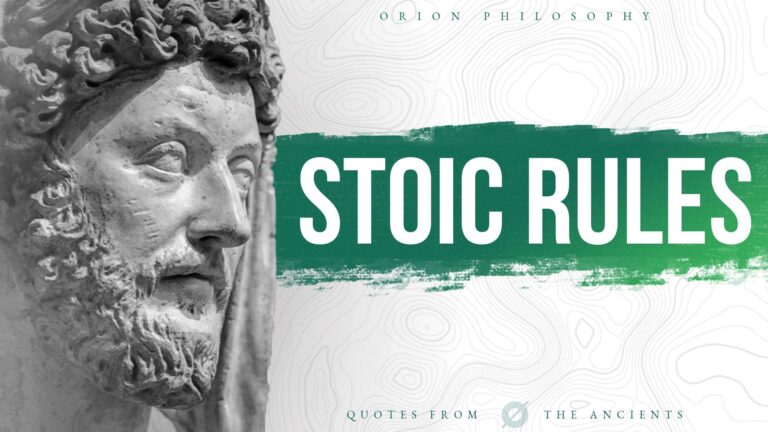Stoicism has been around for thousands of years, and it’s longevity is simply due to the fact that it works.
The Stoics have left us with a way of life that promotes wisdom, resilience, and peace of mind. The philosophy also promotes effective discipline, temperance, and self-control.
It outlines the importance of good behaviour, the toxic effects of bad behaviour, and why strength of character should be prioritised above everything else.
When we learn to build Stoic principles into our own lives, we can develop the self-control needed for good character, personal growth, and the pursuit of our goals in whatever passion or purpose we’re pursuing (even alliteration).
In this article, I’ll be exploring the teachings of these Stoics and discovering how they can be applied to help build temperance and achieve lasting self-control.
Core Takeaways:
-
Stoicism promotes self-control as part of the foundation for good character.
-
The practice of Stoicism is based on the four virtues of wisdom, justice, courage, and temperance. Virtues that help us build strength of character.
-
Stoicism teaches us to focus on our actions rather than our words.
-
We can build character through Stoic practices, such as morning and evening reflections, focusing on what we can control, and practicing gratitude.
-
Learning from ancient philosophers like Marcus Aurelius, Seneca, and Epictetus, we can learn by example and use their wisdom to build our own practice.

Why is discipline important?
Simply put, discipline keeps us going in the right direction when motivation doesn’t show up.
As you probably already know, discipline is one of the most important qualities in personal development and leads to success in almost all aspects of life.
It is the key to achieving personal and professional goals, allowing us to stay focused, on task, and consistent in our pursuit of them.

Discipline also acts as a defence against the negative effects of poor self-control. Many activities, like excessive eating, video games, TV, drinking, gambling, etc., have a corrosive effect on our wellbeing. It serves as a wall against these things because it prevents their lure from controlling our actions and behaviour.
Having self-control helps us overcome distractions and resist impulses that drag us off track (I’m looking at you, Netflix).
It helps us stay on track even when faced with challenges, resistance, and desires, ensuring we maintain our commitment to what we want long-term.
Benefits of Discipline
The benefits of discipline are not limited to the achievement of our goals. It can also include things like:
-
Improved productivity: it helps us become more organized and structured in our approach to life, leading to increased productivity and efficiency.
-
Enhanced focus: it allows us to prioritize tasks, minimizing distractions and enabling us to stay focused on what truly matters and what we value.
-
Greater self-control: With discipline, we can resist the temptations and impulses that come from some of the more destructive areas of life. This means we can make more rational decisions and choose long-term benefits over short-term gratification.
-
Increased resilience: it helps us persevere through challenges and setbacks, bounce back from failures, and maintain a positive mindset when faced with adversity.

Understanding Stoicism
Stoicism is a Hellenistic philosophy that originated in Athens in the 3rd century BC.
It focuses on the development of wisdom, justice, courage, and temperance as virtues for leading a good life.
The Stoics believe in accepting the unpredictable nature of the world around us, remaining resilient to it, and accepting control of our actions and mindset. They emphasize the importance of focusing on one’s own thoughts, actions, and beliefs, as these are the only things truly within our control.
You can learn more about it here.
Stoic Practices for Building Discipline
We can look deeper into Stoic philosophy to find specific examples on how to build and develop our own self-control and temperance
Below are some Stoic practices to help you develop some of the skills and mindsets needed for solid temperance.
1. Morning and Evening Reflections
Our first Stoic practice for building self-control is morning and evening reflections.
A lot of what we do is done out of habit. If we have strong enough habits, we don’t even need to think about what we’re doing, we just do things. Kind of like an autopilot.
The problem with this type of behaviour is that we’re often not aware of what we’re doing because it’s so engrained in our routine and we’re not consciously thinking about what we’re doing.
This can mean that a certain level of destructive behaviour has been built into our lives, and we’ve simply accepted it as the norm.
What reflection does is allow us to revisit the day and take a look at what happened. It acts as a sort of retrospective awareness. If we don’t notice negative behaviour in the moment, we can use reflection to catch it later. Now that we’re aware of it, we can think about how to prevent it from happening again.
So, in the morning, take a few moments to reflect on the upcoming day and set intentions for how you will approach and handle areas of your life you think can be improved.
Similarly, in the evening, review the actions and behaviours of the day, identifying areas where you could have exercised more discipline or self-control.
You can learn more about nightly habits here, and morning habits here.
2. Recognizing What is Within Your Control
A fundamental Stoic principle for developing all kinds of behaviour is recognizing what is within your control and accepting what is not.
In this context, when we learn to accept that we have absolute control over our thoughts, actions, and behaviours, we have no other option than to accept that it’s us who define where we focus our energy and attention. We can’t blame other people or the world around us for what we do; we are responsible.

If there’s a behaviour you want to stop, it’s on you. If there’s a project you want to start, it’s on you. There is no other way.
To begin this practice, look at your life and begin to split things into what you can control and what you can’t. Then focus your efforts on things that you have the power to change.
This will generally be your thoughts, actions, and attitudes. When you focus on these things while accepting what is beyond your control, you can overcome distractions and stay focused on what truly matters.
3. Learning to Embrace Challenges
Challenges and adversity are generally something people want to avoid in everyday life. We often like the idea of overcoming a heavy challenge, but in reality, when faced with hardship, the ideas aren’t so attractive.
Stoicism, however, argues that embracing challenges can present itself with a number of opportunities for growth.
So, rather than avoiding difficulties or seeking comfort, if we actively seek out challenges that will test our resolve, discipline, and resilience, we can deliberately use adversity to build these skills and test them in the real world.
This could be deciding to walk past your favourite donut store on the way home from work and not buying one. It could be going to a bar with friends and drinking a soft drink; it could be loading up your PC to work on a side project and not opening YouTube or Steam to play a video game (even if they have a sale…).
4. Mindfulness of Thoughts and Actions
While it might not be immediately obvious, mindfulness plays a critical role in building discipline.
If we can develop an awareness of our thoughts, emotions, and actions in real time, we can better understand and control them.
For example, if we have a trigger that causes us to pull out our phone and doom-scroll through social media, if we make an effort to be present in the moment, we can catch ourselves doing the actions, recognise the trigger, and stop ourselves in the act.
Now that we’re aware of the trigger, we can recognise it next time and be better prepared to deal with it. We can even rewire our response to a trigger. For example, instead of opening our phone every time we sit down on a train seat, we can choose to take that book we’ve been meaning to read.
Practice being mindful of how external events and situations impact your internal state, and engage in intentional actions that align with your values and goals.

Finding Inspiration in Stoic Philosophers
The following are a handful of ancient Stoic role models whose work contains a huge amount of valuable teachings and insights on mastering discipline, self-control, and personal growth.
Each of them has their own written work which I think it a great starting point to learn more about ancient philosophy.
Marcus Aurelius
“Meditate often on the interconnectedness and mutual interdependence of all things in the universe.”
Marcus Aurelius, the Roman Emperor and Stoic philosopher, wrote the famous book “Meditations,” where he shared his thoughts on self-control, humility, and resilience.
His teachings encourage individuals to reflect on the interconnectedness of all things in the universe, reminding us of the importance of discipline and our place in the grand scheme of life.
Seneca
“True happiness is to enjoy the present without anxious dependence on the future.”
Seneca, a prominent Roman statesman and Stoic philosopher, wrote extensively on topics such as anger, adversity, and the pursuit of virtue.
His teachings show the significance of living in the present moment and finding contentment in the here and now. Seneca is generally easy to read and very accessible.
Seneca’s wisdom serves as a reminder to develop discipline by focusing on the present and avoiding worrying about the future.
Epictetus
“He is a wise man who does not grieve for the things which he has not, but rejoices for those which he has.”
Epictetus, a former slave turned philosopher, taught Stoic principles to many notable individuals in ancient Rome. As a student of Musonius Rufus his philosophy is to the point, straight forward, and no nonsense.
His teachings encourage individuals to cultivate gratitude and appreciate what they have rather than dwelling on what they lack. Epictetus is also known for his Dichotomy of Control, a concept that appears numerous times in his lectures.
Epictetus reminds us to embrace behaviours such as gratitude to develop a positive mindset and strengthen our self-control.

Conclusion
To end, Stoicism offers us some great insight that can contribute to building discipline and self-control.
If we take some time to apply Stoic principles in our daily lives, we open ourselves to the opportunity to develop resilience, emotional intelligence, and the ability to stay focused on our goals despite external pressures that try to drag us off course.
The virtues of wisdom, justice, courage, and temperance can be used as a kind of compass for life, as guiding principles that can shape our behaviour and our approach to challenges.







I just began reading Meditations and realized that I can never let my copy leave my side… I’m in awe
Meditations has so much value in it. I’d recommend reading Epictetus’ Discourses and Enchiridion as well. Marcus Aurelius’ Stoic philosophy is heavily influenced by Epictetus.
I’m really impressed with your writing skills as well
as with the layout on your blog. Is this a paid theme or did you modify it yourself?
Anyway keep up the nice quality writing, it is rare to see a great
blog like this one nowadays.